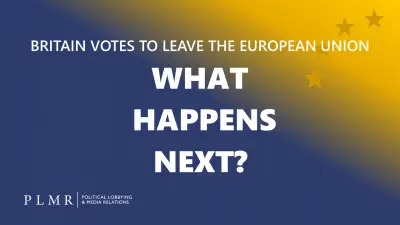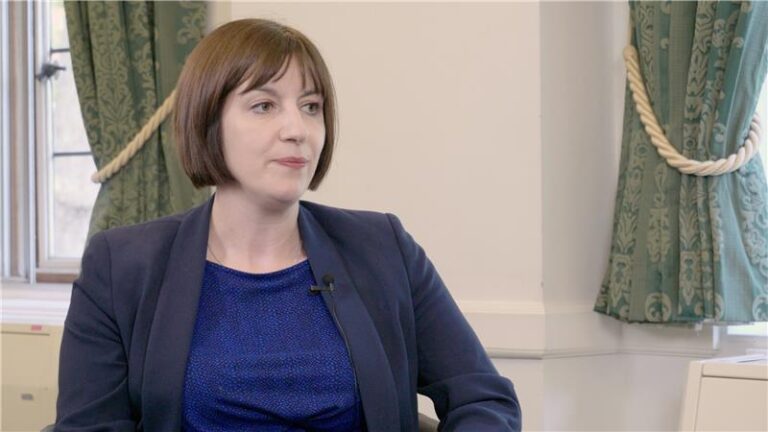A HISTORIC MOMENT
Joe Mitton is a Senior PLMR Consultant. Until May 2016 he was an adviser to Boris Johnson MP as Mayor of London, and formerly represented the Australian Government at the G20 Summit.
I am writing to you having started the day with a conference call with PLMR Managing Director Kevin Craig at 4am when we first realised that Vote Leave had won. It is a historic day with immense ramifications. In the seven hours since, the Prime Minister has resigned, sterling has fallen over ten per cent and we have already seen a speech of reassurance from Bank of England Governor, Mark Carney, to try and calm the reaction. In the last few minutes, Boris Johnson and Michael Gove have sought to reassure that Britain will continue to be a great European power.
Hedge fund exit polling had predicted a narrow win for the Remain camp, causing markets to rally on 23 June. This morning’s result has led to a swift market reaction. In this climate, political leaders’ first priority will be to reassure citizens and businesses. The instinct will be to make calming predictions and statements of confidence about the route forward. The uncomfortable truth is that no-one has absolute certainty about how the political situation in the days to come will unfold. Rapid market reaction is all but assured, and indeed has been in play since markets opened in Asia several hours ago. We do, however, have some near-certainties, and this will be a consolation to businesses which have struggled with the uncertainty of the campaign period. We will have a new Prime Minister soon – for thoughts on the circumstances and timing of this, please see the section below by my colleague and Conservative Party expert James Ford. Of more certainty is the fact that the UK will have to leave the EU. The formal process will not start until a new Prime Minister is appointed, and is likely to take years.
Major private sector investment decisions that were on hold for several months will now be reconsidered. The fall in the value of the pound, however, will offset this situation and may even result in a boost for some sectors such as manufacturing for export markets.
Analysts are divided as to the extent that there will be contagion of the rest of the world economy. The risk is one of confidence, not material output, and so very much will depend on the tone used by continental and especially British politicians in the days to come. The tone of the referendum campaign has not been edifying but perhaps now political leaders will send the messages of stability and an orderly, negotiated Brexit that markets will be craving to hear. In that event, the temporary shock to the economy could abate after a fortnight or so, although the longer-term effect on the UK’s economic growth trajectory is unclear.
Political leaders must choose their words extremely carefully – phrases such as “orderly, negotiated transition” should be repeated ad nauseum. So too, it is in the self-interest of businesses to emphasise stability and to note the positive aspects of this change. While business leaders largely (but not wholly) supported the Remain campaign – and indeed they should not repudiate those statements – businesses now have the opportunity to talk about the stable, mature transition that they want to see, and indeed can also look at opportunities for reform. There is the chance to re-write much regulation, and businesses can and should have a positive and bold influence on this process. The language that a business uses publicly, and in private to legislators, should be measured. But the ideas behind them can be bold.
CAMERON RESIGNS – CONSERVATIVES EMBARK ON LEADERSHIP CONTEST
James Ford, a former aide to Boris Johnson during his mayoralty, analyses where the Conservative Party stands now, and what happens next.
The votes have been counted, the people have spoken and the Prime Minister has resigned. British politics moved into uncharted waters today as the repercussions of last night’s vote for the UK to leave the European Union reverberates around Westminster and the Square Mile.
Implications – The Government
** In the wake of PM’s resignation, the urgent priority of senior Conservatives – whether Ministers or grandees – is going to be minimising market jitters, and presenting a united front, so expect senior Brexiteers to spend the day praising David Cameron.
** All eyes will be on Boris Johnson and Michael Gove and what they do next. It might look crass if Boris Johnson throws his hat in the ring too soon, though it will be a question he is asked repeatedly in the coming days.
** George Osborne is unlikely to remain Chancellor for long, and his leadership ambitions are holed below the waterline in the eyes of many – especially in light of the botched ‘Brexit Budget’ gambit. However, it would not help market situation if he quits today too (plus, as First Secretary of State he is technically the deputy PM!). Expect him to try to be ‘kingmaker’ behind the scenes for a leadership contender from the ‘Cameroon’ wing of the party.
** There is already speculation that Education Secretary Nicky Morgan is considering running for party leader. Other names to watch include Theresa May, Michael Gove, Sajid Javid, Priti Patel and Amber Rudd.
** Graham Brady, Chairman of the 1922 Committee, will have to set out a timetable for the leadership contest – will he try to get the parliamentary phase over before recess (20 July)??
My blog from Wednesday sets out how Tory leadership contests work.
General Election
** There was some speculation on BBC this morning that all this could lead to a General Election to heal national differences. There is no appetite in any party for a General Election to confirm the referendum result or elect a new government – PMs can change without reference to the public (indeed, half of the UK’s post-war prime ministers took office initially without a general election – Eden, Macmillan, Douglas-Home, Callaghan, Major, Brown)
** However, a new Tory Prime Minister may want to call one soon after taking office (later this year or early next) in order to secure a mandate, to avoid the mistake that Brown made in 2007 (the election that never was), and to try and pull off a quick victory over Jeremy Corbyn. The Fixed Term Parliament Act does not prevent this happening (but it does make it harder than it used to be)
** The likelihood of another General Election within 12 months has risen sharply
WHAT DOES THIS MEAN FOR LABOUR?
Stefanie Lehmann is a PLMR Account Executive, an active member of the Labour Party, and a co-founder of Labour grouping Consensus. Stef examines what the referendum result means for Jeremy Corbyn and his party.
The EU Referendum may have temporarily taken our minds off the splits in the Labour Party, but its result may well deepen them. The morning after has already seen sustained criticism of Jeremy Corbyn’s EU campaign, notably from Tim Farron, the Liberal Democrat leader, who accused Corbyn of letting down the country by failing to mobilise the Labour vote. The Parliamentary Labour Party will be extremely disappointed in what has been perceived as a lacklustre campaign from the Party’s leadership, and rumours of a coup will likely return to stay – though it remains doubtful that Labour MPs would want to exacerbate the possible instability of the coming weeks and months.
Geographic analysis of the Referendum results shows that there is a clear disconnect between the Labour vote in London – epitomised by Islington’s vote to Remain by a majority of more than 50,000 – and the voters in the traditional Labour heartlands in the English North and the Midlands, who strongly voted to Leave. This result reflects the criticism Corbyn’s leadership has been incurring already – of only appealing to a London elite and neglecting the concerns of more deprived parts of the country.
By contrast, the Labour Party membership, particularly in its new, expanded form, may feel that Corbyn’s stance as a sceptical Remainer most represented the electorate compared to all the other party leaders’ positions. This view would mean that Corbyn’s lacklustre campaign may in fact have benefitted the party’s dwindling working class appeal. Indeed, this is the line that has been issued to the Parliament by the Leader’s office this morning; but chances are Labour MPs will be even less likely than before to swallow their disappointment and present a united front. And as the Prime Minister’s resignation has not removed the possibility of an early election, Labour MPs may well be concerned that the current leadership is ill-equipped to tackle the challenges ahead.
ANOTHER SCOTTISH REFERENDUM?
PLMR’s Scotland Manager Robin Dyet assesses the landscape in Scotland today.
Scotland emerged as the most pro-EU place in the UK yesterday, with 62% of Scots voting Remain. There have already been early indications from a number of senior SNP politicians, including Nicola Sturgeon and Alex Salmond (who predicted today’s results four weeks ago) that a second referendum on Scottish independence is likely, following, as they put it, ‘Scotland being taken out of the EU against our will’. The national result will have serious ramifications for the Scottish contingents of all of the main Westminster parties, as well as the future of the UK itself. In the last few minutes, Nicola Sturgeon has held a press conference to make it abundantly clear that she is exploring all options to keep Scotland part of Europe, and that a second Scottish Independence referendum is ‘highly likely’.
** All of Scotland’s 32 local authority areas backed Remain, but turnout (67.2%) was significantly down on 2014 referendum (84.6%)
** Remain majority in Scotland also not as significant as many predicted, with 38% voting Leave
** Some members of the SNP favoured a Leave vote as they saw it as the best way to achieve a second independence referendum. Leader of the Scottish Conservatives, Ruth Davidson, has ruled herself out of the running to replace David Cameron, and urged the party to reunite
** Scottish Labour Leader, Kezia Dugdale, urged the UK Government to prioritise protecting our economy
** The referendum result will have implications far beyond Britain’s relationship with the EU – it could eventually lead to the breakup of the UK itself
NORTHERN IRELAND – ANOTHER REMAIN STRONGHOLD
Analysis by James Ford, PLMR Senior Consultant.
** Like Scotland, Northern Ireland was one of the UK nations and regions that voted to Remain – and did so overwhelmingly
** Northern Ireland is the only part of the UK that has a land border with an EU member state, and it will be the relationship with the Republic of Ireland that dominates the thoughts of Northern Irish policy makers, businesses and citizens in the weeks and months to come
** A critical priority for the UK and Irish governments will be avoiding the imposition of border controls between the two countries once the UK has left the EU
** The referendum result may re-open old wounds – and political divisions – within the province, especially as Nationalists have already claimed that this vote has renewed the case for Irish reunification
BREXIT TIMELINE – WHAT NEXT?
Steven Gauge, Senior Consultant at PLMR and former aide to Liberal Democrat leaders Nick Clegg and Charles Kennedy outlines the likely milestones and events over the coming days, weeks, months and years.
This Morning – Brexit: Day One
** The UK has voted to leave the EU
** David Cameron has announced that he will step down as Prime Minister, effectively staying on for a three month notice period to manage the initial process and calm the markets
** Expect urgent action by the Treasury, Bank of England in efforts to support the pound and calm the stock market
** Parliament expected to be recalled to debate the immediate next steps
** Anti-EU politicians across Europe calling for referenda in their own countries
** Feverish behind the scenes speculation and positioning in Conservative circles about the next leader of the party
Next Week
** David Cameron to attend the European Council to explain the UK’s decision to leave the EU and his own decision to step down
** EU expected to call an Emergency Summit
** The EU’s negotiating positions for the conditions around the UK exit will emerge. There will be a strong desire to to take a tough line, “pour encourager les autres.”
** Political power and media attention concentrates around leading leave campaigners notably Michael Gove and Boris Johnson
** Some EU meetings may be held without the UK present as the remaining 27 nations debate and decide their tactics for the negotiations for UK withdrawal
The Coming Months
** Conservative leadership election process begins following formal notice of Cameron’s resignation. Candidates declare themselves and require the support from just two fellow MPs. MPs vote to whittle down the list to two candidates for Conservative party members to choose their new leader from. The new leader will be in place by the Conservative Party Conference which starts on the 2nd October 2016.
** Cameron has stated that he will leave the new leader to determine the timing of the point at which the UK formally notifies the EU of its intention to invoke Article 50 of the EU constitution. Michael Gove has suggested that the entire process could take up to five years, so the formal notification may not happen for several years. Greenland, with a population of 55,000, took 3 years to extract itself from the EU’s predecessor the European Economic Community following a referendum vote to leave in 1982.
The Coming Years
** As soon as Article 50 is invoked there are two years for negotiations to be completed
** The EU Council of Ministers will issue directives to the Commission to steer the exit negotiations. Each will be subject to increased Eurosceptic pressures in their home nations
** 80,000 pages of EU agreements will expire and the UK will need to decide what form any alternative agreements might take.
** Having “taken back control” the UK parliament will be dominated by debates around which EU related laws to repeal and replace.
** An “Australian style” points system will emerge to control immigration, ready to be implemented soon after the EU exit is complete
** Negotiations will cover issues including: residual EU payments between Britain and the EU; the acquired rights of UK citizens living and working in Europe and EU citizens in the UK; pensions of British EU civil servants, and the future home of EU agencies currently based in the UK
** If no trade deal is agreed the UK will move to a standard WTO relationship, with the risk of significant tariffs on exports
** Scottish National Party will use the issue to trigger a second Scottish Independence vote at the point that they think it could be won.






